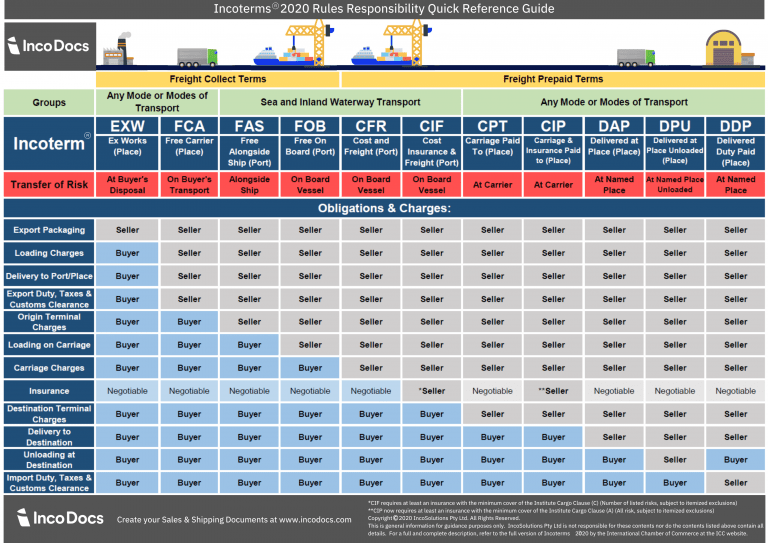
ICC Incoterms®: The Power Behind Three Simple Letters
4 months ago
ICC Incoterms®: The Power Behind Three Simple Letters

Who would have thought that a set of three-letter acronyms could reshape the course of international and domestic commerce? This transformation is thanks to a visionary group of industrialists, financiers, and traders determined to foster economic growth in the wake of World War I. Their ambition led to the founding of the International Chamber of Commerce (ICC), which sought to bring order to global trade where no consistent rules existed. Recognizing the need for standardized guidelines, these pioneers developed what we now know as the Incoterms® rules, a global standard that revolutionized trade practices.
Below is a summary of the 11 rules from the Incoterms® 2020 edition:
• EXW (Ex Works): The seller makes the goods available at their premises, with all other responsibilities, including transport, customs, and insurance, resting with the buyer.
• FCA (Free Carrier): The seller hands over the goods to a carrier or another party chosen by the buyer at a specified location, with risk passing to the buyer at this point.
• FAS (Free Alongside Ship): The seller delivers the goods alongside the vessel at a named port. The buyer assumes risk and costs from this point forward, with this term only applicable to sea transport.
• FOB (Free On Board): Risk transfers to the buyer once the goods cross the ship’s rail at the port of shipment, with the seller handling export clearance. This term is also sea transport-specific.
• CFR (Cost and Freight): The seller arranges and pays for transport to the destination port, but the risk transfers to the buyer once the goods pass the ship’s rail at the port of shipment. Sea transport only.
• CIF (Cost, Insurance, and Freight): Similar to CFR, but the seller must also provide minimal insurance coverage. Risk still passes once the goods pass the ship’s rail. Sea transport only.
• CPT (Carriage Paid To): The seller delivers to a carrier and covers transport to a specified destination, with the buyer assuming risk after delivery.
• CIP (Carriage and Insurance Paid To): Like CPT, but the seller is also responsible for providing minimal insurance, with additional coverage available by agreement.
• DAT (Delivered at Terminal): The seller is responsible for delivering and unloading the goods at a terminal, with the buyer taking on import-related duties and costs.
• DAP (Delivered at Place): The seller delivers the goods to the buyer at a named location, ready for unloading. The buyer handles all import formalities.
• DDP (Delivered Duty Paid): The seller covers all costs and risks, including customs duties, until the goods are delivered to the buyer’s destination, ready for unloading.
The evolution of Incoterms® has mirrored the shifting dynamics of global trade over the past century:
• 1923: Following its founding in 1919, the ICC launched its first study on commercial trade terms, revealing significant inconsistencies in their interpretation across 13 countries.
• 1928: A more comprehensive study, involving over 30 countries, shed further light on discrepancies in trade term usage.
• 1936: The first Incoterms® rules were introduced, setting global standards for terms like FAS, FOB, and CIF.
• 1953: As rail transport grew, the first post-WWII revision added terms for non-maritime transport, including DCP, FOR, and FOT.
• 1967: The third revision addressed earlier misunderstandings and introduced DAF (Delivered at Frontier) and DDP (Delivered Duty Paid).
• 1974: The rise of air travel led to the addition of the FOB Airport term to prevent confusion with sea transport.
• 1980: The proliferation of containerized shipping and improved documentation prompted the creation of the FRC (Free Carrier) term.
• 1990: The fifth revision streamlined Free Carrier terms and incorporated provisions for electronic communications.
• 2000: Further refinements were made to address changing customs clearance procedures.
• 2010: Incoterms® 2010 consolidated various delivery terms and introduced an increased emphasis on buyer-seller cooperation and string sales.
• 2020: The latest update, released in response to the evolving needs of global trade, was shaped by extensive consultation with users worldwide.
The Incoterms® rules have provided a vital framework for global trade over the last 80 years, evolving in response to new transportation methods, technologies, and legal landscapes, and continuing to serve as a foundation for smooth commercial transactions worldwide.
Source: Container News